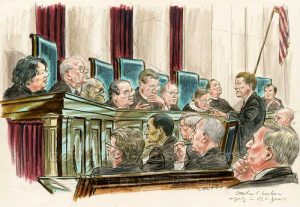U.S. v. Jones
United States v. Jones
565 U.S.___ (2012)
Vote: 9-0
Opinion of the Court: Scalia
Concurring Opinion: Sotomayor
Opinion Concurring in Judgment: Alito
Facts: The FBI and D.C. Police were investigating Antoine Jones for cocaine trafficking; officers put Jones under visual and technical surveillance, as well as tapped his cell phone, in an effort to gather enough evidence to convict him of this crime. For all surveillance against Jones, officers obtained warrants, also obtaining a warrant to install a GPS device on his car to track his whereabouts. Pursuant to the warrant, officials were required to install the device within a ten-day period and in the District of Columbia. Officers failed to comply with the specifics of the warrant, instead placing the device on Jones’ car on the eleventh day in Maryland. The device collected over 2,000 pages of data for the police during the twenty-eight days it was attached onto Jones’ car. The data transmitted by the device helped convict Jones of multiple crimes, including cocaine trafficking and conspiracy to distribute cocaine. Jones was convicted in district court, but his conviction was reversed in the D.C. Appeals Court. The United States requested Supreme Court review.

Legal Question: Does the affixation of a GPS tracking device onto a suspect’s car outside the parameters of a police warrant violate the Unreasonable Searches and Seizures clause of the Fourth Amendment?
Holding: Yes.

Opinion of the Court: Justice Scalia
The crux of Justice Scalia’s opinion is as such: the installation of and data gathering from the GPS is a “search” under the 4th amendment definition (Jones’ car is his private property and the government physically intruded upon that property), because the government was operating outside of the bounds of the warrant, this constituted a warrantless and therefore illegal search, and that one can reasonably expect privacy in regards to their property (since Jones’ car is his property, he had a reasonable expectation of privacy in regards to his car).

Of note is Justice Sotomayor’s concurrence, in which she states that she agrees that in this case there was an illegal government search upon Jones’ car. She expounds upon the Court’s interpretation of the Fourth Amendment, arguing that an illegal search extends past property trespasses and to a government violation of a “subjective expectation of privacy that society recognizes as reasonable.”
In plain English terms, Justice Sotomayor is arguing that a property trespass would qualify as an illegal search under the Fourth Amendment, but we need not satisfy that definition in order to still have an illegal search. Instead, Sotomayor argues that a search could be deemed illegal even if it violates an expectation of privacy that is determined by the public. Such an expectation of privacy is subjective and not objective, meaning that society, not the law, determines if a violation occurred. This is an interesting argument Sotomayor pursues, as it would treat no two Fourth Amendment cases equally, subjecting each case to opinion about a violation rather than precedent. Of course, precedent would play a role, but it now would share the weight with any subjective opinion about the nature of the violation. In a Court comprised of (hopefully) nine individuals all with differing opinions, the next Fourth Amendment case, if Sotomayor’s standard were used, could be unpredictable.
In the Digital Age as well this assertion has repercussions: a growing faction of citizens are more and more active on social media, and while Facebook, Instagram, and Twitter are public spheres, it is possible that people assume that there is a reasonable expectation of privacy in regards to their messages, pictures, and usage data. Take for example, the public outcry when it was discovered that Facebook was mining the data of its users. This discovery was met with rage and disdain, but Facebook’s actions were neither surprising nor illegal. It would be interesting to see if the Supreme Court ever reviews a case having to do with a conviction aided by a social media post, as Sotomayor’s definition of an illegal search would illicit tensions within the Justices’ interpretations of the Fourth Amendment.
If you want a good video summary of this case, check out this video!